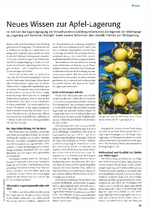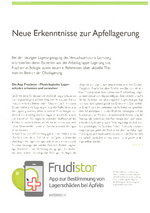New developments in the storage of apples
Causes for physiological disorders:1) Disadvantageous growing and weather conditions favor physiological disorders like calcium-shortage.
2) Early or late harvest promote to disorders such as scald, cracking, senescent breakdown or core browning.
3) Improper storage conditions: storage of cold-sensitive varieties (Cripps Pink/Pink Lady®, Scifresh/Jazz® oder Pinova) at too low temperatures leads to external cold damages or internal cold-related pulp browning. Is the CO2-level too high for some varieties, it leads to internal flesh browning and cavities, low O2 levels might result in fermentation damages.
Laimburg Research Centre (LRC) takes part in the development of the application „FrudiStor“, which should make compact expertise about storage disorders available.
Alternative storage methods with DCA:
In the dynamically controlled atmosphere by the means of Chlorophyll-Fluorescence (DCA-CD), a fluorescence-signal indicates if the O2-level is too low and can therefore be adjusted to the conditions of the fruits. Thus, physiological damages at the fruit can be reduced.
An alternative DCA-measure tested is DCA by the means of the Respiration quotient (DCA-RQ). The quotient results from the relation between generated CO2 and consumed O2 through the respiration of the apple during storage. The RQ-storage conditions increase the production of ethanol.
Ripening process and quality of apples from high altitudes:
A comparison of the quality of Golden Delicious apples from high and medium altitudes showed that apples of high altitudes have a more intense yellow, are firmer and contain 25 to 30% more acidity. The apples from the high altitudes, however, were more susceptible to the greasiness. No relevant differences regarding the sugar content and the ripening process. High altitudes are more susceptible to the weather conditions and the yield is not as high as in moderate altitudes. The exposition of the orchard plays an important role in this regard.
Regulation of the ripening in the orchards:
The product HarvistaTM, applied in the orchard ca. 1 week before harvest, delays the ripening process, like SmartFreshSM, applied in post-harvest.
Advantages: the harvest management can be optimized (a later harvest can lead to more yield) and the active component (1-MCP) might have positive effects on the storage ability and the quality of the fruits. The breakdown of starch is delayed, the firmness increased and HarvistaTM might have a positive effect on pre-harvest falling. These advantages depend on the duration of the caused ripening delay on the specific variety and of the weather conditions.
Documents

|
Neues Wissen zur Apfel-Lagerung (New knowledge about apple storage) () Ines Ebner, Julia Strobl, Angelo Zanella (Versuchszentrum Laimburg), Neues Wissen zur Apfel-Lagerung (New knowledge about apple storage), 10.11.2017, Sonderheft Nr. 1 des Südtiroler Landwirt, Nr. 20, 55-56. |

|
Neue Erkenntnisse zur Apfellagerung (New findings regarding apple storage) () Ines Ebner, Julia Strobl, Angelo Zanella (Versuchszentrum Laimburg),Neue Erkenntnisse zur Apfellagerung, October 2017; Apfel Aktuell (3); JG31; 36-39. |
Details
- Activity type
- Publication in technical journal
- Activity work package
- Fruit quality; improvement of fruit handling/storage
- Activity number
- Laimburg-WP4-A123
- Activity contact
- Dr. Angelo Zanella
Laimburg Research Centre
Laimburg 6 - Pfatten
I-39040 Post Auer (BZ), Italy
[email protected] - Activity partner
- Laimburg Research Centre
- Activity country
- Italy
- Last edit
- 28-05-2018

The EUFRUIT thematic network has received funding from the
European Union's Horizon 2020 research and innovation programme
under grant agreement No 696337.
European Union's Horizon 2020 research and innovation programme
under grant agreement No 696337.